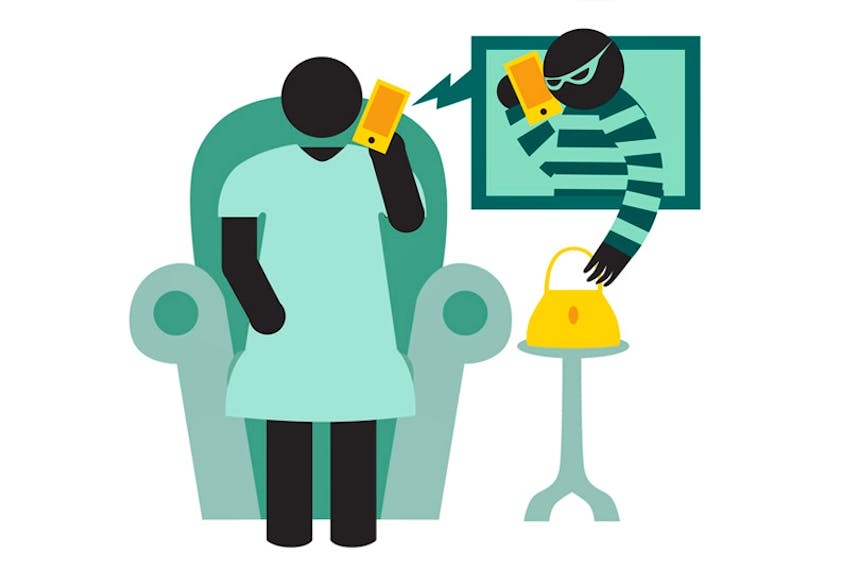It started off innocently enough, with a few friendly messages on Facebook from another senior who certainly seemed like the real deal.
“I had a street address (for him) and the whole bit,” said Heather Marchione.
The then-72-year-old divorcee started exchanging text messages with her newfound friend on the social media platform and got to learn several things about him. Like her, he was apparently of Italian heritage. Allegedly a 60-year-old engineer living in Arizona, he said he traveled extensively to other countries for business and had a grown daughter.
Quickly, their social media exchanges turned into almost daily phone calls.
“It was fun having someone calling you every night and asking, ‘How was your day?’” said Marchione.
The budding friendship lasted for about a month. During that time, he provided Marchione with a telephone number for his supposed daughter and encouraged them to speak over the phone. Marchione did call her. A woman’s voice answered and they had a conversation.
And then, it came. The ask.
This is the goal of every scam artist seeking to defraud seniors of their savings, a crime that’s almost impossible to solve and is part of what is believed to be widespread and largely under-reported financial abuse of seniors.
Although some of this financial abuse is perpetrated by organized crime syndicates, a lot of it is also done by family and friends of seniors. That makes it even more difficult for police forces to catch the culprits.
“We’re only hitting the tip of the iceberg and it’s going to get worse (as Atlantic Canada’s population continues to age),” said Const. Tom Wood, crime prevention officer for the Amherst Police Department.
“It’s a very under-reported crime... the senior population does not want to come forward because they are embarrassed and they have a strong sense of loyalty (to their families).”
In Marchione’s case, the ask came when the scam artist was ostensibly in a foreign country to work on a bridge development.
“His scam was the daughter,” she said. “Apparently, she had a brain tumor. He had her in a private school… but she had to go tothe hospital and was in the emergency and needed US$5,000… He gave me detailed instructions to wire the money.”
Marchione now admits that by then she believed all of this was real. Sure, there had been a few red flags, like his claim that he didn’t use credit cards even when traveling and staying in hotels that usually require a credit card to reserve rooms. But she had been speaking with him almost daily for about a month.
“He should have gotten an Academy Award,” she said. “He was darned good.”
Marchione’s saving grace was that she didn’t know exactly how to wire money from her bank account. She called the customer service line to get more information and told the person at the other end of the line what she was being asked to do. The bank saved her from making a big mistake.
She didn’t send the money. When she called her supposed friend, the scam artist, he got very upset, used foul language, and that, well, was the end of that. Marchione hasn’t heard from him since.
But even though she didn’t fall victim to this scam artist, Marchione admits she hasn’t gone to the police or shared her story until now because – like many other people who are victims of these scams – she feels “stupid” for having been fooled.
She is only coming forward now to share her story to ensure other seniors will realize it’s not their fault and they have to speak up to put an end to this financial abuse.
Surveys conducted by CARP, a national organization for seniors formerly known as the Canadian Association of Retired Persons, of its roughly 350,000 members show that 34 per cent of them have either been either abused themselves or know of another senior who has been abused.
Annual CARP survey results released from 2011 through to 2015 show that between 39 per cent and 50 per cent of that abuse of seniors is financial.
Canada’s police forces, though, only ever find out about a tiny fraction of it.
“Only 10 per cent is reported. That’s what we’ve been saying over the years,” said Bill VanGorder, a national director of CARP and spokesman for its Nova Scotia chapter.
According to VanGorder, there are three main kinds of scams currently targeting seniors. These include investment fraud, where a senior is encouraged to put money into a phony investment vehicle.
A second popular scam involves a call to a senior citizen, reporting alleged irregularities at their bank and soliciting their help in what is supposed to be an attempt to catch the culprits. Under this scam, the senior is asked by the con artists posing as police or bank security officials to go to an automated teller machine and withdraw a sum of money. The fake security officials then ask for the money under the guise that it will be used to take down the fraudsters at the bank under investigation.
And there’s the catfish scam.
That’s the kind of scam used by the con artists who tried to victimize Marchione. Under this scam, the con artist, the catfish, creates a fictitious online identity to start up a fake relationship. These can be romantic relationships or just friendships.
The ultimate goal of creating that relationship is to exploit it to bilk the victim, often of thousands of dollars. Const. Wood says another popular scam is to play on the grandparents’ love for their grandchildren. Under this con, the scam artist calls the senior, pretending to be one of the grandchildren, maybe faking a cold to explain the change in the sound of his or her voice. The scammer will concoct some sort of emergency that requires the wiring of money, perhaps bail money for a false arrest or a medical emergency.
“You wouldn’t think it would work but grandparents will do anything for their grandchildren and they wire them the money,” said the police officer.
But those who financially abuse seniors are often a lot closer to home. In many cases, it is family and friends who dip into the senior’s bank account or take their credit cards.
“Caregivers or family members gain access to the senior’s credit or debit card, usually for legitimate reasons, to buy groceries or something, and then they start dipping into it for their own purposes,” said VanGorder. “It starts off very innocently but once you start doing it, it gets easier and easier.”
After deciding to not send the scam artist the US$5,000 he was demanding, 74-year-old Marchione turned around and made her money work for her.
“I invested it in the stock market after that … and doubled it," she said. "I got some really good stocks. I’m very proud of that.”
New laws needed to help protect seniors from scams: CARP
Laws to protect seniors from financial abuse are decades behind advances in similar legislation that's created new protections for women from domestic violence and children from physical abuse, says Bill VanGorder, a CARP national director.
“At the moment, people who perpetrate fraud (against seniors) realize that they can’t be caught and, if they are, then nothing will be done to them,” said VanGorder in an interview. “They have to be held accountable.”
CARP, a national seniors organization, has been lobbying Ottawa for years to pass legislation to force those who work with the elderly to report suspected cases of abuse. A survey of CARP’s roughly 350,000 members shows almost a third of them want professionals dealing with the elderly to be better trained in family dynamics and enjoy whistleblower protection for reporting suspected cases of abuse.
Const. Tom Wood, crime prevention officer for the Amherst Police Department, says financial abuse of seniors is very difficult to investigate and prosecute in part because victimized seniors often do not want to lay charges.
The reasons for that reluctance? Embarrassment at being conned – and loyalty to family members who, in many cases, are the very people committing that financial abuse.
That used to be a problem for police forces in many domestic violence cases. Decades ago, abused spouses could simply decide to not lay charges for that domestic violence. Then, the law was changed.
Now, police officers can make arrests and charges can be laid in domestic violence cases even when the victim refuses to co-operate, said Wood.
There is a lack of similar legislation allowing police to lay charges in cases of senior financial abuse without the co-operation of the victim, he said.
“A grandparent will do anything for their grandchild so they will often not want to proceed with the investigation (when it is the grandchild who has committed the financial abuse),” said Wood.
The Amherst Police Department regularly offers Senior's Police Academy sessions to people aged 55 and up to discuss such topics as power of attorney, wills and fraud. The RCMP also holds similar information sessions.
“Education is the key to find out what’s out there and for family members to be able to spot the abuse,” said Wood.
Relatives who financially abuse seniors often do so with no signs of remorse when they get caught, he said.
“They almost feel like grandma is a free ATM machine – even though grandma, who wants to keep that relationship open and not complain, may be struggling to buy food,” said Wood. “A lot of the senior population is not living like kings.”
A publication issued by Canada’s federal, provincial and territorial ministers responsible for seniors urged victims years ago to come forward.
Tips included: keeping financial and personal information in a safe place; being very cautious about opening joint bank accounts as the other person can also take out all the money without asking; keeping a record of money given away with a note as to whether or not it was a loan or a gift; getting independent legal advice before signing documents involving property; asking a trusted counselor to look over contracts and other papers before these are signed; and having an enduring or continuing power of attorney.









